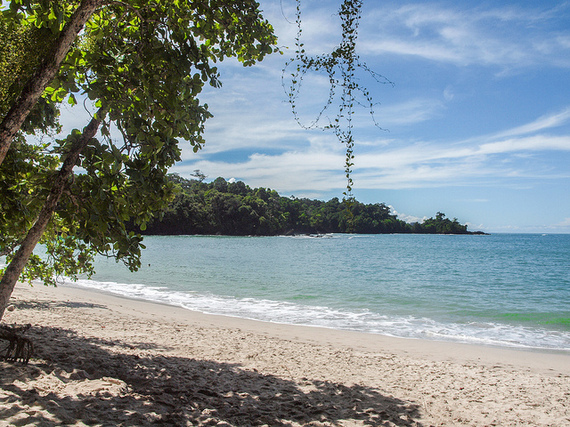This article comes to us courtesy of InternationalLiving.com, the world's leading authority on how to live, work, invest, travel, and retire better overseas.
After a long career in Silicon Valley, Robbie Felix, 58, was ready for a change. "I showed up there in 1978 right after they broke up the telephone monopolies, and it was booming," says Robbie, who worked as a headhunter specialized in staffing start-up companies. "I loved it. It was fascinating, but extremely stressful. There was a lot of pressure because there was so much money on the table."
Stock in these soon-to-be-booming companies, as well as more conservative investments, left Robbie with a tidy nest-egg (though she lost some in the market crash)... but with no clear plan about what to do next. Then, "a voice told me it was my destiny to come to Costa Rica and help others," says Robbie.
A visit with friends, during which she saw an amazing sunset over the Pacific from a hillside restaurant, sealed the deal. "Costa Rica is a lot like how Hawaii was 30 years ago," explains Robbie. "I used to live in rural Maui."
 Manuel Antonio, Costa Rica
Manuel Antonio, Costa Rica
Photo by Jason Holland, InternationalLivingcom
So she moved to Costa Rica 14 years ago to start a new life and hasn't looked back since. She lives in Manuel Antonio, a beach town on the central Pacific coast that is a tourist center, thanks to a very popular national park and to beautiful beaches. It also draws long-term expats.
"I bought a hotel in 2000, because I didn't know what to do with myself," says Robbie. Hotel California, set in the rainforest on a hill high above the blue Pacific, was a bit run-down when she bought it. So Robbie launched a full-scale renovation before reopening. In Costa Rica, where construction often happens at a more relaxed pace, it took just five months. And it wasn't only the hotel that changed in the process. Robbie soon realized she was still hanging onto the "go-go-go" mentality of her old workplace. So she learned to relax and adopt more of a pura vida attitude. (Pura vida is Costa Rica's motto and essentially means "life is good.")
"You don't realize it, but after living here, you slowly become more and more like a local Tica," says Robbie. "Have I mellowed? God, yes!"
Perhaps most importantly, Robbie has also found some relief from lupus, a serious chronic illness that has affected her for years, especially with arthritis and skin allergies. She credits the climate of her adopted home and the excellent medical care for her improvement.
"Before I moved to Costa Rica, I lived in Santa Cruz, California, where the cold weather just gets into your bones. My doctor told me that, if I moved to a tropical climate, my arthritis would improve," says Robbie. "Since moving, I haven't had arthritis in years. The clean air in the rainforest, the ocean... it's like breathing medicine." Robbie has also found some very low-cost medical care for her condition -- she uses the private system and says she wouldn't be covered by insurance in the U.S. for her condition. "My medications, which would cost about $3,000 per month in the U.S., are only 20 to 30 percent of that in Costa Rica. And many of my prescriptions have actually gone down in price."
A self-described "old hippie," Robbie was drawn to Manuel Antonio because it accepts alternative lifestyles and looks. Her dyed red hair (it's blue these days) and tattoos didn't raise eyebrows. Plus, there was something romantic in the air -- the people found joy in life.
Hotel California attracts a variety of guests: young, retired, Latin American, and North American. Most, says Robbie, are nature lovers and down-to-earth folks who frequent the nearby national park during their visit.
"The beach has been voted in various magazines as one of the most beautiful in Central and Latin America," she adds. "And there is a lot to do here, from canopy tours, surfing lessons, biking, rafting, kayaking, and estuary tours."
Occupancy in low season (mid-September to mid-November) drops as low as 40 percent. It jumps in high season (which coincides with the dry season of December to April) to about 80 percent.
"We use a lot of online marketing. We also work with travel agencies and specialize in group travel in the low season," explains Robbie.
There are 22 employees, about 30 percent of whom have been with her eight years or more. But she still takes an active role in running the hotel. Says Robbie: "I am here at least four days a week; I am the driver. I make plans for marketing, maintenance, accounting, and all departments, and they are implemented by a resident manager. I meet with all the employees once a week and do follow up. I deal with legal issues, financial issues, and technical issues."
But Robbie also spends a lot of time in San Pedro, a neighborhood in the capital, San José. On the Caldera Highway, completed in 2010, her trip is just under three hours. It used to take nearly four-and-a-half hours. The Universidad Latina de Costa Rica (known as Ulatina) is nearby, as is the University of Costa Rica, which means it's a vibrant place full of students and culture.
"There my friends are artists, musicians... I go to art shows--I collect modern Costa Rican art, I see live music. I love the exchange of ideas," says Robbie. "It's the best of both worlds."
Related Articles:
Creating an Income on a Beach in Belize
Sunsets and Profits on the Beach in Puerto Vallarta
Owning a Café in a Costa Rican Jungle Town
Earlier on Huff/Post50:
